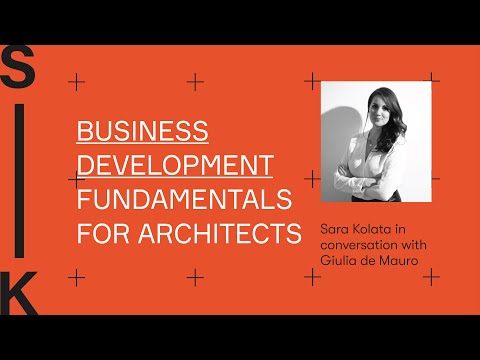Arch Talk: Tank #48: Business Development Fundamentals for Architects

hello everybody this is sarah colatta with architecture talk tongue and my guest today is julia de mauro extremely happy to have julia and host her today at uh this podcast and talk a little bit about the fundamentals of scaling up your architectural practice topic super close to my heart as well super excited for that chat julia thanks so much for joining me today thank you sarah for the invite it's a pleasure um so julia tell us a little bit about yourself and the business um and sort of the problems that you sold for architects yeah so i'm the founder of the abd company um and we uh basically help architects to either start to uh expand and find projects uh nationally and internationally so uh i'm very happy to be here and and discuss this topic that is also close to my heart because i think a lot of architects need to know how how to scale up and how to find new clients and new projects absolutely so tell me julia maybe to start with what led you to um to provide these kind of services i understand you're also an architect yeah so um when i started as an architect i saw that um there was um well we we were not talk business or uh marketing at university and when i started working i found out that even uh the biggest architecture practices did not necessarily know how to scale up and we're just trying to make it work um so my attention went to how to solve that problem in a practice and throughout my experience i i started helping uh firms to to to find projects abroad and to can make it sustainable so uh that's when i i you know i decided to to start um for myself and and see if i could help more people at once yeah it says how it came to me there is a huge gap um and i think there is more and more people see this problem and see that they have the skills to do it and you know it's important now to find these people and to train them correctly in business and marketing so that they can help the industry to move forward absolutely so what would you say is like the three top issues that you find architects struggle with in respect of growth uh issue is that when they start a practice they usually have a first client first issue that i see like what happens after the first project um the second issue that i see is also how do i build teams when people are starting to hire in an architectural practice who should i hire and um how should i manage that because that's also the difficult part three is um in my opinion how can i find more clients on a constant base because a lot of architects do some business development like maybe one month and then they get a project and they stop business development until the end of the project and then it's not a constant thing right so these are the three main issues that i regularly see people confronted with yeah it's very interesting what you say because i think that um the general sort of mentality is to commit to your design work and we're sort of taught to all the processes that that entails we know how to follow the flow of that sort of project delivery um but when it comes to like overlaying it as well with business development and marketing which frankly should happen all year round all the time because you never know um what sort of marketing strategy or or campaign can bring you the next best client um i think that people really struggle to manage that so um what would be like the first advice that you would give in respect of um for people that start the fundamental of growth what should they think about in order to create a good foundation to grow a practice yeah that's a good question i think that um you can be the best architect in the world but if no one knows that you're doing that then you're not going to get projects so for me the first thing problem that i'm trying to solve for the client and how do i go about it in my own way to solve it and communicate that through social media platforms through the website through speeches or even pitching during uh events and um and the point is if you make your discussion about the problem of the client like with you much more because a lot of times architects only talk about their references and their projects and the details of it and a client is not an architect they don't necessarily speak the same language all they want to know is how can you help me so i think that step is to think like okay what kind of problem do i like to resolve and it doesn't need to be uh if you for instance believe in sustainability uh your added value is going to be to they don't know where to start for instance so you need to make that message very clear so that people are able to contact you and that you attract the right clients as well you don't want to attract a client that doesn't care about sustainability for instance so it's not going to lead anywhere of course so yeah make the message here and communicate it i think that's that's the best way how about you what do you what do you think uh yeah no i agree with you 100 and i think that um something that i didn't quite realize at the beginning of doing uh like my coaching with clients but it came quite apparent uh later on as i got more and more clients that i think people really find it hard to define what problems a client could have because you know for example you're in residential space which is a lot of times where we start right we maybe get like a refurbishment or an apartment or actually build like a extension and you know how do you define a problem really i mean what am i um you know what what is exactly the problem of a customer and i think at the beginning like when we were um talking the the big idea of this um was relevant to me from a perspective of marketing but when i started working with clients it was um it was apparent that people struggle to define that um do you maybe from your experience have an advice of how to go about it to understand your customer better and understand really what are the key challenges that they face as their loot for architects um i think that the first step is really to ask yourself personally what what are your values what do you truly believe in because the secret to a sustainable business is really to know to do something that you really like and that you really believe in so the first step for me is to make a list of what you value in your life and in your work um and then through that to think about okay skills that i have and the ambition that i have and um to even uh set up what age do they have uh what kind of fields uh where can you find them um have a strategy to contact them and to do a marketing strategy so to take to put in place so basically we could say for example that by understanding your customer better you go through this process of knowing when is the moment for them to make a buying decision it might be for example when they start a family or grow their family or get freshly married or take a mortgage so perhaps a way to solve problems is to understand the current scenario they're in and what sort of decisions they're have they're impacted by as they um as they go through a process of investing in a new build or an extension or whatever it is that requires your services and address that to communicate that with with these um with this highly targeted audience so that they feel like your communication is relevant yeah and it's also i mean that's that's true uh for for housing and private if you take real estate um uh in general you need to show that you can bring something extra onto the table right and even if you are a startup um you need to provide a value and to use ai to solve some problems for a building whether it is um to use certain softwares or something you need to really identify like okay why am i different than the other person not better but just different and it's the same for housing like what is your your added value and um how can you understand a certain type of families for instance or you know you need to to kind of clarify um what what you're suited best for yeah if that makes sense yeah so know yourself better basically in the process understand your own need um and your own vision for how you want to run this business what sort of projects you want to get involved with and then follow that yes super important yeah yeah i love that you know it's at the end of the day it's kind of reflected back at the person in subjects a lot of times we're trying to find the answers outside of ourselves and you know outside of um what this business is what the community needs but i think going back to where you want to be is extremely important uh moving on from this i wanted to ask you a little bit about the whole topic of growth because when we talk about growth it's one obviously communicating your your unique value proposition and developing that relationship telling your potential customers what you can do for them but then it's this whole kind of aspect of sales which is kind of considered a bit of a dirty word in architecture and i know that it very much relates to also your work and what you help architects do um so what are like the key takeaways if we were to talk about sales specifically in the architecture practice that people should think about as they are planning for scaling and growing so for me like the pitching structure that we use um the first step is to to prepare prepare the meeting asking yourself okay what kind of client uh is it and what kind of problem do they have right um and then when you go to the meeting you should be the person to ask questions actually to the client before you start even teaching right so like okay what kind of uh project are you looking to to invest in uh why do you want to invest in this well what is the difficulty that you have uh at the moment uh can you not find an architect that you like or is it that and you need someone to help you with that try to pinpoint okay what is your problem and then from there you need to show empathy and authority so empathy you understand his issue and authority means tell him that you have seen this problem before and you have sold it for another client even if you haven't you have just started your practice you probably have seen that problem during your time in a different company so like you have seen that problem so you need to show authority through that and then from there you just give them um maybe an example of a project that you have worked on before they had a similar issue um and then you give them an action plan okay if we start working together the first step is going to be that we discuss it together and i do a first an initial sketch and then you know you break it down for them so that they really understand and then the the final key key word the final thing is um is take them to actions you never want to leave a meeting without another meeting scheduled or without um them sending you um the program or you know there needs to be an action that the client needs to do to take things further and i think you should never leave a meeting without setting up another meeting that's also very important um so yeah so that's for me the the kind of the structure of pitching that i would say the important thing is not to um focus on your references because a lot of our their projects for hours but um we are not not everybody is an architect and and that's the failure at university is that they teach us to pitch our projects to other architects so we tend to speak only the architect language but um very often to my client and i make them say like imagine i'm a child and you're pitching to me like what kind of words are you gonna use so that you simplify the vocabulary that you use absolutely i think that's a really really good advice and a lot of times i think in that at that moment also it's worth thinking about you know maybe a potential potentially a similar project that you develop to a similar client maybe with a family and say how you enrich their life by the design decision you took back there you know maybe you know we we made bigger windows in the kitchen um to to brighten up a space where they gathered to eat or talk about their experiences in the space and how that can change um and also refer back to topics that are relevant specifically to this case rather than talking in general about past projects i think it's very valuable um advice because we do have a tendency of spreading ourselves super thin in words when we describe our design solutions um but they're sometimes completely out of topic for architects for sure so um also one more thing that i wanted to touch on in respect of generally growing um we have to always remember sort of the the difference between legendary lead generation and sales efforts um and i think that um generally when we get into um that the for for us marketers or people that are a bit more aware of marketing we understand that it's a numbers game and that um you know it's a little bit like with dating you go on many dates but you fall in love you know the the few times where you feel really connected and it's a little bit like that giving yourself that possibility to filter through potential customers before you choose to work with one or two um can you share some advice or or some of your experience in respect of sort of working with with companies with architecture practices and and sort of to really emphasize the difference between the generation and actually closing a sale and how that is a journey of its own as well yeah i think that a lot of architects um misunderstand what lead generation is and how much effort it takes in business development to trigger a sale um and my advice to that that if you want um you know three projects by the end of the year how many people do i need to meet before i get one meeting and then how many meetings and just like that you can um see how many lead generation so how many people you need to connect me yeah if you have 12 months you won the three projects you need i think at least uh to to have um 10 hot leads to get one project so that means there's 30 hot leads with three projects um and you probably get one hot lead out of i don't know 50 people that you meet that gives you the right number of people that you need to meet and you need to make these contacts whether it is um through social media through linkedin connecting with people and stuff and make sure that that you're there and i think that um [Music] i think that a lot of architects don't understand this person you in it a lot of people think it's a waste of time to connect with this many people it's you actually in order to have a client the client needs to see your brand at least 70 times before they actually buy um and you know before it was one to seven now is one to seventy because we're bombarded with things on linkedin and social media and networking events are with thousands of people so you need to be present um and you need to be locked with people because maybe a connection that you meet today it's going to give you a project in two years time exactly you never know so it's yeah it's it's the it's a chaos but it that's how business works of course and what would be an advice for people that perhaps haven't grown their teams um sufficiently to have a marketing department um how does uh you know a smaller practice or a startup manage um all of these different marketing efforts and responsibilities that are added to providing design work um i think that either either way even if you have a marketing department which is you know just just a few companies that manage to have that i think it should be a team effort so like from the owner to the intern everyone should be present on social media but also to events and um you know just values of the company and how they can help and i think from the perspective of social media one post every day about one of the problems that you solve for a client is sufficient enough to be visible throughout the day to your whole network especially on linkedin or facebook or whichever platform you you decide to get so giving va tips for clients or um you know little problems that you sold for the client and more than enough to be visible i think um you don't need necessarily a whole marketing team to do that absolutely yeah that is in the company up to that no that's uh that's very true and i think that um one obviously shared effort into localizing and focusing on two or three channels marketing channels and doing it well um rather than trying to do 16 things marketing efforts at the same time which i find a lot of people are the moment they open the marketing book they start implementing every single advice in the book and that can also spread you thin so i think you know really localizing where your audience is whether this would be in instagram and i think for architects instagram pinterest even works well um but linkedin is incredible because with search navigator you can create a very well targeted audiences and frankly attract clients through the detail of their earning annual earnings or geography or um position uh etc so that is definitely a great tool for architects um to look into and envelop as well well julia thank you so much um tell us a little bit about your company and your services and also where people can find you if they wanted to connect sure so uh well you can find me on linkedin uh at julia tomorrow um and yeah if you need help to start your own business or if you're already a comp and you want to find projects uh abroad or or nationally um we can help you so uh if anybody has questions also about this topic um feel free to to message me on linkedin excellent that's brilliant so thank you so much for joining me and sharing your expertise with my audience and thank you forward also to to hear more um from well basically just wanted to mention julia has a podcast she's also very active on clubhouse guys so if you wanted to find out a little bit more she's got a bunch of educational efforts as well going on online and you can follow this activities online and find more information on the website so i'm looking forward to more content as well from you julia and and thank you so much for joining thank you so much for the invite and thank you all for listening
2022-01-08 23:25


